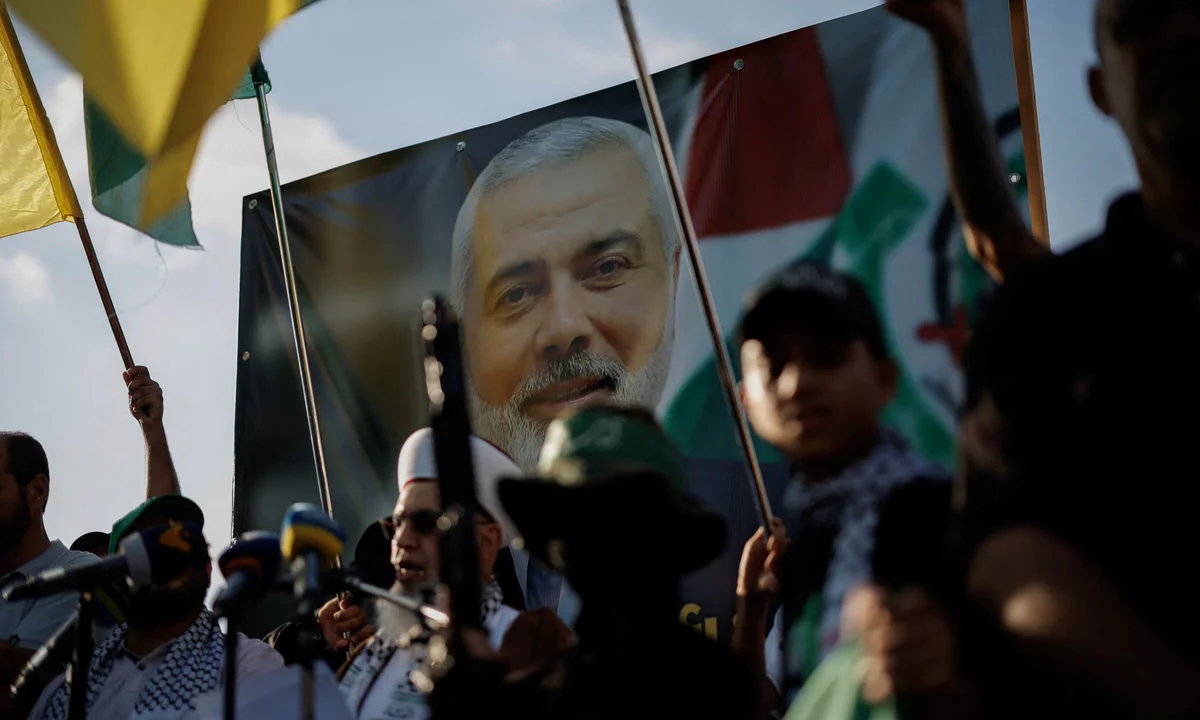Department of Translation and Interpretation
31-07-2024
Like all prominent Hamas figures, Ismail Haniyeh lived under the constant threat of assassination; his death in the Iranian capital of tahran in a reported missile strike. The death of Ismail Haniyeh, a prominent figure in Palestinian politics and leader of Hamas, could significantly alter the geopolitical landscape in the Middle East.
Ismail Haniyeh has been a central figure in Hamas, the Palestinian Sunni-Islamic fundamentalist organization. Founded in 1987 during the First Intifada, Hamas has been a major player in the Israeli-Palestinian conflict, advocating for Palestinian self-determination and resistance against Israeli occupation. Haniyeh’s leadership has been marked by his efforts to balance military resistance with political engagement. Haniyeh’s leadership role in Hamas took root in 1997 when he became Yassin’s personal secretary. In 2006 Hamas participated in the Palestinian legislative elections, with Haniyeh heading the list. The group won a majority of seats in the parliament, and Haniyeh became prime minister of the PA. Haniyeh relinquished his post as prime minister. He remained the local leader of Hamas in Gaza, however, until he was replaced by yahya sinwar in 2017. Months later, Haniyeh was elected chief of Hamas’s political bureau, replacing khaled meshaal.
Haniyeh’s death will not change Hamas’s goal of destroying Israel. Israel’s strike on Haniyeh is a strategic gamble. While many Israelis will take grim satisfaction at the death of a leader of the group that organized the October 7 attack that killed 1,200 Israelis and started a war that has killed almost 40,000 Gazans, previous attacks on Hamas’s top leadership like Ahmed Yassin in 2004 have not changed Hamas’s intent to destroy the state of Israel. The strike will almost certainly derail ceasefire-for-hostages talks for weeks, at best, so the short-term consequences could be considerable.
The medium-term consequences for how the war ends are likely smaller, however. Israel is determined that Hamas not have a role in postwar governance in Gaza, and Hamas has been angling for a role that preserves its ability to rebuild itself militarily into a Hezbollah-like military power without the burden of civil governance. Hamas’s military leaders are more important to the group’s strategy than its exiled political leadership like Haniyeh.
Immediate Reactions
The immediate aftermath of Haniyeh’s death is likely to witness a surge in violence. Historical precedents indicate that the death of a high-profile leader often triggers retaliatory attacks. For example, the assassination of Hezbollah’s Imad Mughniyeh in 2008 led to a series of retaliatory attacks against Israeli targets. Similarly, Haniyeh’s death could provoke Hamas and its affiliates to launch rocket attacks on Israel, leading to a harsh military response from the Israeli Defense Forces (IDF).
The fragile relationship between Israel and the Palestinian territories is likely to deteriorate further. Haniyeh’s death could derail any ongoing peace negotiations, as Hamas might adopt a more hardline stance in his absence. This situation is reminiscent of the aftermath of Yasser Arafat’s death in 2004, which saw a decline in peace talks and a rise in militant activities. The escalation of violence could prompt Israel to intensify its military operations in Gaza, potentially leading to a broader conflict.
Regional Implications: The Role of Iran and Hezbollah
The assassination of Ismail Haniyeh should surprise no one other than Iran’s Air Defense Force. Israel was clear on October 8 that it would seek to eliminate Hamas leadership anywhere in the world. Israel has not targeted the group’s political leadership in Doha out of respect for Qatar’s role as mediator, at the behest of the United States. Traveling to Tehran to attend Pezeshkian’s inauguration was a known risk.
One thing is certain: This assassination will not alter Hamas military leader Yahya Sinwar’s calculus. In fact, when news of the assassination first broke, I heard questions among Palestinians about whether this was an inside job orchestrated by Sinwar to eliminate a colleague who might sell him out. It would not be the first Sinwar assassination of his own political leaders.
Hamas’s ties with Iran and Hezbollah add another layer of complexity. Iran, a major supporter of Hamas, might perceive Haniyeh’s death as an opportunity to bolster its influence in the region. Increased financial and military support to Hamas could embolden the group to launch more sophisticated attacks. Hezbollah, based in Lebanon, might also coordinate with Hamas to open a new front against Israel. The 2006 Lebanon War provides a stark example of how quickly conflicts can escalate when multiple fronts are involved.
Reactions from Arab States
The reaction of Arab states will be crucial in determining the regional impact of Haniyeh’s death. Countries like Egypt, Jordan, and Saudi Arabia have traditionally played a mediating role in the Israeli-Palestinian conflict. However, their responses could vary. Egypt, which has a vested interest in maintaining stability in Gaza due to its border with the enclave, might intensify its security measures and push for de-escalation. Conversely, countries with strained relations with Israel might use the opportunity to criticize Israeli actions, further inflaming tensions.
Conclusion
The death of Ismail Haniyeh holds the potential to significantly escalate tensions in the Middle East. The immediate surge in violence, potential internal power struggles within Hamas, and the broader regional implications involving Iran, Hezbollah, and Arab states all point towards a precarious path ahead. The international community’s response will be critical in mitigating the risk of a regional war. As history has shown, the death of a significant leader can be a catalyst for both increased conflict and renewed diplomatic efforts. The direction the region takes will depend on the actions and reactions of the key stakeholders in the coming weeks and months.

